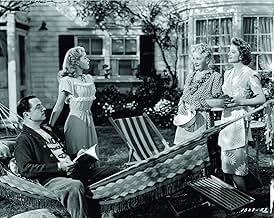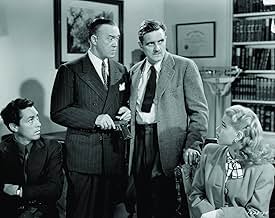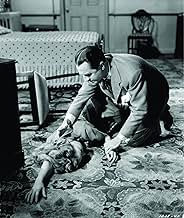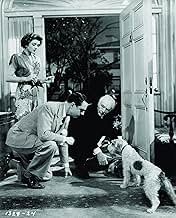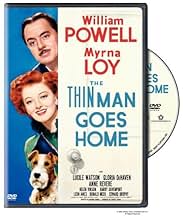NOTE IMDb
7,3/10
6,7 k
MA NOTE
Ajouter une intrigue dans votre langueNick, a private detective, visits his hometown with wife Nora. Locals believe he's investigating a case. When someone is murdered on his doorstep, Nick gets embroiled in solving the crime de... Tout lireNick, a private detective, visits his hometown with wife Nora. Locals believe he's investigating a case. When someone is murdered on his doorstep, Nick gets embroiled in solving the crime despite intending a vacation.Nick, a private detective, visits his hometown with wife Nora. Locals believe he's investigating a case. When someone is murdered on his doorstep, Nick gets embroiled in solving the crime despite intending a vacation.
- Réalisation
- Scénario
- Casting principal
Gloria DeHaven
- Laura Ronson
- (as Gloria De Haven)
Anita Sharp-Bolster
- Hilda
- (as Anita Bolster)
Avis à la une
It's 1945, the trains are packed with people, Asta doesn't remain hidden under Nora's fur coat so Nick, Nora and Asta end up in the baggage car as they travel to Nick's home town. And Nick is drinking only cider - his father never approved of drink. Thus begins, "The Thin Man Goes Home," made as the war was ending and a lot of people whose lives had changed were thinking about going home.
Nick, it turns out, has an uneasy relationship with his doctor dad because he himself never became a doctor. When the inevitable mystery arises around a murder, Nora wants Nick to solve it to impress his dad.
The fact is, the scripts of "The Thin Man" series never mattered. It was always the acting and interaction of William Powell and Myrna Loy, and here, as usual, they're great - loving, flippant, and funny. Since Nick is always falling on the floor or getting hit on the head, it's hard for anyone to believe he's sober. At a charity dance, in order to do some investigating, he gives his dance tickets to a sailor and Nora becomes his partner. The dance scene is hilarious as the sailor tosses Nora all over the place and swings her around with the kind of maneuvers you see in pair figure skating.
The war is still on so the story involves espionage. A very young Gloria de Haven does nicely as a self-consciously over-dramatic young woman; Harry Davenport and Lucile Watson are great as Nick's parents; and the later blacklisted Anne Revere does a fine job as Crazy Mary.
William Powell could read the phone book with class and humor; Loy looks beautiful and their teamwork has never been better. Highly recommended.
Nick, it turns out, has an uneasy relationship with his doctor dad because he himself never became a doctor. When the inevitable mystery arises around a murder, Nora wants Nick to solve it to impress his dad.
The fact is, the scripts of "The Thin Man" series never mattered. It was always the acting and interaction of William Powell and Myrna Loy, and here, as usual, they're great - loving, flippant, and funny. Since Nick is always falling on the floor or getting hit on the head, it's hard for anyone to believe he's sober. At a charity dance, in order to do some investigating, he gives his dance tickets to a sailor and Nora becomes his partner. The dance scene is hilarious as the sailor tosses Nora all over the place and swings her around with the kind of maneuvers you see in pair figure skating.
The war is still on so the story involves espionage. A very young Gloria de Haven does nicely as a self-consciously over-dramatic young woman; Harry Davenport and Lucile Watson are great as Nick's parents; and the later blacklisted Anne Revere does a fine job as Crazy Mary.
William Powell could read the phone book with class and humor; Loy looks beautiful and their teamwork has never been better. Highly recommended.
Everybody has at least one skeleton in their closet, and Nick Charles is the man who can bring them out into the daylight. The fifth film in the excellent 'Thin Man' series sees our favourite married detectives, Nick and Nora Charles (William Powell and Myrna Loy), visiting Nick's parents in the small town of Sycamore Springs, a sleepy locale where everybody knows everybody and crime is practically non-existent
or so they thought! The famous detective's arrival is greeted with a wave of controversy, despite his own insistence that the visit is merely a quiet vacation. With everybody under the impression that Nick is investigating an important case, long-forgotten skeletons begin to emerge from their hiding-places, a young artist is shot dead on the doorstep and an ordinary-looking painting of a windmill becomes a vital clue in identifying his murderer.
'The Thin Man Goes Home' was the first film in the series not directed by W.S. Van Dyke, after he committed suicide in February 1943. Nonetheless, Richard Thorpe does a good job of recreating the mystery and good humour of the previous instalments, working off a script from Robert Riskin, Harry Kurnitz and Dwight Taylor. There are also a few notable adjustments to the usual formula: the action takes place in a small town rather than the city, and Nick Charles has gone completely teetotal {no doubt a consequence of the WWII liquor rationing}. Aside from obviously solving the mystery and apprehending the killer, the film has another important sub-plot concerning Nick and his disapproving father. Nora makes it her goal to convince Dr. Charles (Harry Davenport) that his son is, indeed, a detective genius, and fuels the rumours in a not-so-subtle fashion that he is here on a case. However, his father won't believe that Nick has gone off drinking, and various unfortunate moments of bad-timing do little to prove him otherwise.
Of course, the main reason we watch 'The Thin Man' movies is to enjoy the witty banter and playful rivalry between husband and wife, and a lot of it is still here, even if it takes a back-seat to the murder mystery itself. Just like the audience, Nora believes that she understands Nick's mystery-solving tactics to the letter, and she enthusiastically narrates his technique to the attentive Dr. Charles, occasionally tossing in her own opinion of the identity of the killer. Of course, she's almost always wrong. This mystery is a muddled affair, with seemingly everyone guilty for at least something, but it's the killer's name that proves a real surprise.
'The Thin Man Goes Home' was the first film in the series not directed by W.S. Van Dyke, after he committed suicide in February 1943. Nonetheless, Richard Thorpe does a good job of recreating the mystery and good humour of the previous instalments, working off a script from Robert Riskin, Harry Kurnitz and Dwight Taylor. There are also a few notable adjustments to the usual formula: the action takes place in a small town rather than the city, and Nick Charles has gone completely teetotal {no doubt a consequence of the WWII liquor rationing}. Aside from obviously solving the mystery and apprehending the killer, the film has another important sub-plot concerning Nick and his disapproving father. Nora makes it her goal to convince Dr. Charles (Harry Davenport) that his son is, indeed, a detective genius, and fuels the rumours in a not-so-subtle fashion that he is here on a case. However, his father won't believe that Nick has gone off drinking, and various unfortunate moments of bad-timing do little to prove him otherwise.
Of course, the main reason we watch 'The Thin Man' movies is to enjoy the witty banter and playful rivalry between husband and wife, and a lot of it is still here, even if it takes a back-seat to the murder mystery itself. Just like the audience, Nora believes that she understands Nick's mystery-solving tactics to the letter, and she enthusiastically narrates his technique to the attentive Dr. Charles, occasionally tossing in her own opinion of the identity of the killer. Of course, she's almost always wrong. This mystery is a muddled affair, with seemingly everyone guilty for at least something, but it's the killer's name that proves a real surprise.
The penultimate Thin Man movie has Nick & Nora visiting Nick's parents when, of course, a murder is committed. This one gives us a look at Nick's background, including that he grew up in a very MGM small town and that his doctor father is disappointed that Nick didn't follow in his footsteps. As the story progresses, the father learns to appreciate what a great detective Nick is. There's also a WWII spy angle and a recurring joke about Nick's newfound sobriety.
William Powell and Myrna Loy are great as ever with that fun chemistry we all love so much. One of my favorite Myrna Loy scenes in the entire series is the one here where she tells Nick's father about the Stinky Davis case. It's hilarious! Nick, Jr. is absent from this one but Asta is still around, albeit played by a different dog this time. The great supporting cast includes Lucille Watson, Harry Davenport, Lloyd Corrigan, Donald MacBride, Leon Ames, Edward Brophy, Helen Vinson, Donald Meek, Morris Ankrum, and a scenery-chewing Gloria DeHaven ("Just call me...Laurabelle."). It's the first Thin Man film not directed by Woody Van Dyke, who died in 1943. Perhaps that's why the movie has a different feel to it than prior entries in the series, although I'm sure we can most probably chalk it up to the changing times and tastes. More than a decade had passed since the first Thin Man film, after all. Still, it's an enjoyable movie that most fans of the series will love. It's hard to miss with Powell and Loy.
William Powell and Myrna Loy are great as ever with that fun chemistry we all love so much. One of my favorite Myrna Loy scenes in the entire series is the one here where she tells Nick's father about the Stinky Davis case. It's hilarious! Nick, Jr. is absent from this one but Asta is still around, albeit played by a different dog this time. The great supporting cast includes Lucille Watson, Harry Davenport, Lloyd Corrigan, Donald MacBride, Leon Ames, Edward Brophy, Helen Vinson, Donald Meek, Morris Ankrum, and a scenery-chewing Gloria DeHaven ("Just call me...Laurabelle."). It's the first Thin Man film not directed by Woody Van Dyke, who died in 1943. Perhaps that's why the movie has a different feel to it than prior entries in the series, although I'm sure we can most probably chalk it up to the changing times and tastes. More than a decade had passed since the first Thin Man film, after all. Still, it's an enjoyable movie that most fans of the series will love. It's hard to miss with Powell and Loy.
Generally the Fourth Sequel to nearly anything would be considered Garbage and You'd think that the Producers had milked the cash cow once too often...BUT 'The Thin Man goes home' the Fourth Sequel and penultimate Film in the Enjoyable MGM Series which ran from 1934-1947 is FAR better than you could really hope for.
Nick (William Powell) & Nora (Myrna Loy) catch a Train to see Nick's Parents merely for a Vacation, but everybody in the Small town are led to believe that Nick is on a Case... He Isn't...Well, Not until a Young man drops dead on his Parents doorstep from a Gunshot Wound -
'The Thin Man goes home' despite being 65 Years old now, doesn't feel anywhere near as dated as many other Films from the Era, There is plenty of Witty lines that are still Funny today and the Sparkling Chemistry between Powell & Loy is a joy to watch.
***1/2 out of *****
Nick (William Powell) & Nora (Myrna Loy) catch a Train to see Nick's Parents merely for a Vacation, but everybody in the Small town are led to believe that Nick is on a Case... He Isn't...Well, Not until a Young man drops dead on his Parents doorstep from a Gunshot Wound -
'The Thin Man goes home' despite being 65 Years old now, doesn't feel anywhere near as dated as many other Films from the Era, There is plenty of Witty lines that are still Funny today and the Sparkling Chemistry between Powell & Loy is a joy to watch.
***1/2 out of *****
All the Thin Man films are great to watch, but this is one with which I find a bit easier to identify. Riskin, the writer of this film and long time scriptwriter for Frank Capra, was also the guy who wrote "It Happened One Night" and "Meet John Doe". This New York City born writer's attraction to average Joe small town values over Cosmopolitan glitz and decadence obvious in those two films is plain to see here. This is probably the image a lot of successful urbanites had about moving to the suburbs after WW2.
This is sort of an odd bird among Thin Man films in a couple of ways. First of all, Nick is astonishingly sober for a change. Don't look for any of those scenes of Nick and Nora trying to drink each other the table at some New York nightclub in this one. In fact, the nightclubs and high rises are totally gone as Nick takes Nora the glamorous New York socialite back for a visit to Nick's hometown, which bears a fairly strong likeness to Andy Hardy's. Nick's father is a retired M.D. not unlike the ones in the Norman Rockwell paintings. He wanted Nick to follow in his footsteps as a small town doctor instead of becoming a big city policeman and this is the first time the two of them have gotten together in years. This father-son reconciliation is the explanation for Nick's sudden uncharacteristic attraction to a sober, healthy lifestyle.
Nick's father is actually fairly proud of Nick and keeps a scrapbook about all his adventures. The whole town knows about Nick Charles the famous Detective. I sort of see invisible images of G.I.s returning home from WW2 in a lot of this movie. Nick's celebrity as a tough, smart local boy who went off to bring gun toting gangsters to justice in the big city of aristocratic sophisticates and Broadway nights is not very far removed from how most Americans probably saw the guys who went off to liberate Paris and Europe in WW2. Nora fits into that picture as a sort of "Mrs. Miniver" figure of what American's admired about European sophication brought back home to meet the folks.
The homecoming hero vision of Nick peacefully turning into a happy coach potato in a post war suburbia however is not what we want to see. What everybody loves about the Thin Man films is their contrary to Hollywood stereotype revelation that life after marriage can actually be exciting. Nora decides to get Nick off the coach with an "I Love Lucy" sort of plot twist that spreads a rumor around town that Nick is secretly working on a detective case. The result of course is that all the various local characters with small town secrets to hide think he's after them and all the mystery murders and skeletons start coming out of the closet like we've all been waiting to see. Nick and Nora are such a fun couple, aren't they?
This is sort of an odd bird among Thin Man films in a couple of ways. First of all, Nick is astonishingly sober for a change. Don't look for any of those scenes of Nick and Nora trying to drink each other the table at some New York nightclub in this one. In fact, the nightclubs and high rises are totally gone as Nick takes Nora the glamorous New York socialite back for a visit to Nick's hometown, which bears a fairly strong likeness to Andy Hardy's. Nick's father is a retired M.D. not unlike the ones in the Norman Rockwell paintings. He wanted Nick to follow in his footsteps as a small town doctor instead of becoming a big city policeman and this is the first time the two of them have gotten together in years. This father-son reconciliation is the explanation for Nick's sudden uncharacteristic attraction to a sober, healthy lifestyle.
Nick's father is actually fairly proud of Nick and keeps a scrapbook about all his adventures. The whole town knows about Nick Charles the famous Detective. I sort of see invisible images of G.I.s returning home from WW2 in a lot of this movie. Nick's celebrity as a tough, smart local boy who went off to bring gun toting gangsters to justice in the big city of aristocratic sophisticates and Broadway nights is not very far removed from how most Americans probably saw the guys who went off to liberate Paris and Europe in WW2. Nora fits into that picture as a sort of "Mrs. Miniver" figure of what American's admired about European sophication brought back home to meet the folks.
The homecoming hero vision of Nick peacefully turning into a happy coach potato in a post war suburbia however is not what we want to see. What everybody loves about the Thin Man films is their contrary to Hollywood stereotype revelation that life after marriage can actually be exciting. Nora decides to get Nick off the coach with an "I Love Lucy" sort of plot twist that spreads a rumor around town that Nick is secretly working on a detective case. The result of course is that all the various local characters with small town secrets to hide think he's after them and all the mystery murders and skeletons start coming out of the closet like we've all been waiting to see. Nick and Nora are such a fun couple, aren't they?
Le saviez-vous
- AnecdotesReplaced for this movie was the canine actor who had played Asta since the first Thin Man film. The original dog, Skippy, outgrew the part.
- GaffesIt has been said that the rifle in the film was a Bren gun and not a Japanese weapon. However, the Nambu machine gun looks very much like a Bren gun. The stock is the most easily spotted give-away. The Bren gun's stock come straight back from behind the pistol grip right behind the trigger guard, while the Nambu's stock has a slight drop to it, right behind the pistol grip. The gun in this film is, in fact, a Japanese Nambu machine gun.
- ConnexionsFeatured in Twenty Years After (1944)
- Bandes originalesHappy Birthday to You
(uncredited)
Written by Mildred J. Hill and Patty S. Hill
Sung a cappella by Lucile Watson and Harry Davenport
Meilleurs choix
Connectez-vous pour évaluer et suivre la liste de favoris afin de recevoir des recommandations personnalisées
- How long is The Thin Man Goes Home?Alimenté par Alexa
Détails
- Date de sortie
- Pays d’origine
- Langue
- Aussi connu sous le nom de
- El regreso de aquel hombre
- Lieux de tournage
- Société de production
- Voir plus de crédits d'entreprise sur IMDbPro
Box-office
- Budget
- 1 000 000 $US (estimé)
- Durée1 heure 40 minutes
- Couleur
- Rapport de forme
- 1.37 : 1
Contribuer à cette page
Suggérer une modification ou ajouter du contenu manquant



